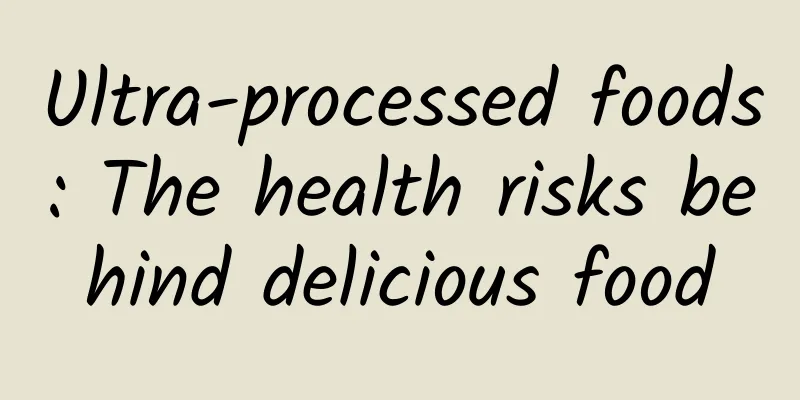Ultra-processed foods: The health risks behind delicious food

|
Author Duan Yuechu In today's rich and diverse food world, ultra-processed foods are quietly infiltrating into every aspect of our lives with their unique charm. Their mouth-watering taste, whether it is the sweet taste of candy, the crisp taste of potato chips, or the rich flavor of various beverages, is hard to resist. Coupled with the convenient way of eating, just put it in your mouth and gulp it down to satisfy your appetite, as well as the overwhelming marketing, TV advertising, and online promotion, you can see them everywhere. In this way, ultra-processed foods occupy an increasingly large share in our diet and seem to have become an indispensable part of life. However, behind this tempting delicacy, there are many unknown health risks. Next, let us explore the intricate relationship between ultra-processed foods and health. 1. Unveiling the mystery of ultra-processed foods In recent years, the focus of research in the field of nutrition has changed significantly. It is no longer just focusing on the nutritional content of various foods. For example, we all knew that whole grains are good for the body, while saturated fat in bacon is not healthy. Now, research focuses more on the degree of industrial processing of food, especially a special type of food - ultra-processed food, which has gradually entered the public's field of vision. According to the most commonly used NOVA classification system, ultra-processed foods and beverages are like a hodgepodge of additives. There are all kinds of industrially produced things, such as oils and fats, which make food taste richer; color enhancers, which make food look attractive and appetizing; flavor enhancers, which give food a rich taste; non-sugar sweeteners, which satisfy people's pursuit of sweetness and reduce sugar intake; and fillers and curing agents, which change the texture and shape of food. The use of these additives does give ultra-processed foods a unique flavor, color and taste, and the shelf life is greatly extended. The brilliant color, stimulating bubbles, and sweet taste of a bottle of soda we picked up in the supermarket are largely due to additives; look at those potato chips, golden and crispy, and fragrant, which are also the result of the combined effect of various additives. In our daily lives, ultra-processed foods can be found everywhere. In addition to the typical ultra-processed foods mentioned above, such as soda, potato chips, and candy, some flavored yogurts also fall into this category. Now, many flavored yogurts have added a lot of sugar, flavors, and thickeners to cater to the tastes of the public. The original natural flavor of the yogurt is covered up, and the nutritional content is greatly reduced. Some of the beautifully packaged breads in supermarkets are also ultra-processed foods. In order to make the bread taste softer and have a longer shelf life, a lot of additives are added. There are also various ready-to-eat foods, such as instant noodles, which can be eaten simply by soaking them. They are convenient and fast, but the noodles are fried, and the seasoning packets contain a lot of salt, MSG, and other additives; frozen foods, such as quick-frozen dumplings and quick-frozen buns, also add some ingredients during the processing process to maintain the taste and extend the shelf life. These ultra-processed foods often undergo a complex industrial processing process, during which the original nutrients of the food are severely damaged, and various additives are added in large quantities. In contrast, there are processed foods and unprocessed foods. Processed foods, such as common canned foods, are mainly processed to preserve food, and relatively few ingredients are added; pickled meats are also processed foods. Although some salt is added for pickling, the overall amount of additives used is not as much as that of ultra-processed foods. Unprocessed foods are simpler and purer. They are the edible parts of plants and animals, such as fresh fruits, which can be picked from the trees and eaten after a simple wash; vegetables, which can be cooked after being picked from the ground; and meat, which can be cut from animals and become a delicacy on the table after simple processing. They may be frozen or dried for storage to extend the shelf life, but basically there will not be too much complicated processing. 2. Health risks caused by ultra-processed foods 1. Nutritional imbalance crisis Ultra-processed foods are like a nutritional "disaster" during the processing process. Take fruit juice drinks for example. Everyone thinks that drinking fruit juice can supplement vitamins and is very healthy. But in fact, when making these fruit juice drinks, the nutrients such as vitamins, minerals and dietary fiber in fresh fruits will be lost in large quantities during the processing process. In order to make the beverages have a good taste and appearance, a large amount of additives such as sugar, flavors and pigments are used instead. If you drink such fruit juice drinks for a long time, your body will not get enough vitamins, minerals and dietary fiber, and it is easy to have nutritional imbalance. You may often feel tired, your immunity will decrease, and your skin will become bad. These are all signals from your body that you are lacking in nutrition. 2. Increased risk of cardiovascular and metabolic disorders A meta-analysis in 2024 sounded the alarm for us. The study found that once the intake of ultra-processed foods is too high, the risk of cardiovascular metabolic disorders will be greatly increased. Many ultra-processed foods contain a lot of saturated fat, trans fat and added sugar. After these ingredients enter the human body, they are like "little demons" making trouble in the body. They will increase the cholesterol, triglycerides and other lipid components in the blood. Slowly, these lipids will accumulate on the blood vessel walls to form plaques, which is the beginning of atherosclerosis. The blood vessels become narrow and blocked, and cardiovascular diseases are easy to come. At the same time, the intake of high sugar and high fat will also reduce the body's sensitivity to insulin, that is, insulin resistance, which increases the risk of diabetes. There are some friends around me who like to eat those sweet cakes and drink sugary drinks. After a long time, they found that there were problems with blood sugar and blood lipids during the physical examination. This is actually related to their long-term and large intake of ultra-processed foods. 3. Hidden links with mental health issues Also in this 2024 meta-analysis, a surprising phenomenon was found that excessive intake of ultra-processed foods is inextricably linked to mental health problems. Although the specific mechanism of action has not yet been fully studied, some studies have speculated that certain ingredients in ultra-processed foods may affect the balance of neurotransmitters in the brain. Neurotransmitters in the brain are like the body's "emotion regulators". Once their balance is broken, emotions and mental health will be affected. Long-term consumption of ultra-processed foods may make people anxious and depressed, and lose interest in many things in life. I have a colleague who is under great pressure at work, so he likes to relieve stress by eating potato chips and drinking cola. As a result, after a period of time, his whole mood became very unstable and he was often anxious. Later, he realized that it might be related to his eating habits, and began to adjust his diet, and the situation slowly improved. 4. The risk of cancer is coming quietly Some ultra-processed foods are simply "creating dangers" during the processing process. Take some processed meats as an example. During the process of pickling and smoking, carcinogens such as nitrosamines will be produced. Once these substances enter the human body, they will damage the DNA of cells and increase the risk of cancer. There are also processing methods such as high-temperature frying, which may also cause potential carcinogens such as acrylamide in food. The ultra-processed foods we usually eat, such as French fries and fried chicken, which are fried at high temperatures, taste good, but if they are consumed in large quantities for a long time, these potential carcinogens will slowly accumulate in the body, posing a serious threat to health. 3. Risk Analysis of Ultra-Processed Foods and Ordinary Processed Foods At present, research on the comparison of disease risks between ultra-processed foods and ordinary processed foods is still ongoing. Although many studies have revealed the many health risks of ultra-processed foods, it must be said that there are still many unknowns in this field. One of the main problems is that there is still no widely recognized definition of "ultra-processed". Although the NOVA classification system is widely used, it is only a rough guide. In actual application, different people and different studies may have different judgment criteria for whether certain foods are ultra-processed foods. This leads to certain difficulties in studying and evaluating the impact of ultra-processed foods on health, and research results may also differ. However, from the existing research situation, ultra-processed foods, due to their complex processing and the use of a large number of additives, do pose a greater potential threat to health than ordinary processed foods. Julie Hess, a nutrition scientist at the U.S. Department of Agriculture, once conducted a study that fully demonstrated the complexity of the ultra-processed food problem. She and her colleagues developed two diet plans, one of which is about 2,000 calories a day, which is in line with the U.S. Healthy Diet Guidelines on the surface, but is mainly composed of ultra-processed foods. One example of breakfast is a breakfast burrito containing liquid egg whites, shredded cheese and canned beans. Although these ingredients seem to be nutritious, they are all processed and contain a lot of additives. The other is a diet plan that is almost entirely composed of less processed foods, but the overall nutritional quality is low. Its breakfast is high-fat, high-sugar pancakes and bacon. This study shows that even if some ultra-processed foods meet health standards in terms of surface data on calories and nutrients, they may still pose health risks due to their processing methods and additives. Just like the breakfast burrito mentioned earlier, although the calories and nutrients seem to meet the standards, eating processed foods containing additives for a long time will still be potentially harmful to the body. The research of Song Mingyang, a nutritionist and epidemiologist at the Harvard T.H. Chan School of Public Health, also pointed out that when studying the relationship between mortality risk and intake, it was found that sugary drinks, such as the common soda water we have, and processed meat and other foods, were associated with increased mortality for people who consumed more every day. Although this increased risk has not been found for some types of ultra-processed foods, such as breakfast cereals and commercial bread, this does not mean that we can consume these ultra-processed foods without restraint. Overall, it is still very necessary to reasonably control the intake of ultra-processed foods. After all, health is our own, and we cannot ignore the potential health risks of some ultra-processed foods just because they do not seem to have obvious harm for the time being. 4. Strategies and recommendations for addressing the challenge of ultra-processed foods How should we deal with the hidden dangers that ultra-processed foods bring to our health? Catherine Bradbury, a nutritional epidemiologist at the University of Auckland in New Zealand, reminds us that we don't have to worry too much about whether a food is technically ultra-processed food, but we should return to the basic principles of diet. We should eat more fruits, vegetables and whole grains. These foods are like the "health guards" of the body. They are rich in vitamins, minerals, dietary fiber and other nutrients, and are of great benefit to health. At the same time, try to avoid foods that are high in calories, saturated fat, salt and added sugar. In daily life, we can reduce the intake of ultra-processed foods through some specific methods. First of all, learn to read food labels. Every time you go to the supermarket to buy something, don't just look at the packaging and price of the food, be sure to carefully check the ingredient list on the food label. Try to choose foods with fewer additives and simple ingredients. If a food's ingredient list contains a large number of chemicals that you don't recognize, be careful, it is likely to be an ultra-processed food, and you should choose it with caution. For example, when you pick up a bottle of yogurt and see that in addition to milk and lactic acid bacteria, there are many other additives on the ingredient list that you can't name, then you can consider changing to a yogurt with simple ingredients. Secondly, choose fresh ingredients and cook them yourself. On weekends, go to the market to pick fresh fruits, vegetables, meat and other ingredients, and cook them yourself at home. Doing so not only allows you to control the food processing and added ingredients, but also better ensures the nutrition and safety of the food. The meals you cook yourself are more reassuring and have a more homely taste. Moreover, during the cooking process, you can also enjoy the fun of making delicious food and enhance the relationship between family members. Finally, we should develop healthy eating habits. Maintain a balanced diet, reasonably combine various foods, and avoid over-dependence on a certain type of food. You cannot eat cakes and candies every day just because you like sweets; you cannot only eat processed meat just because you like meat. At the same time, we should pay attention to the diversity of our diet and take in a variety of different nutrients to meet the various needs of the body. You can eat some oranges rich in vitamin C today, some fish rich in protein tomorrow, and some oats rich in dietary fiber the day after tomorrow, so that you can be healthier. Although ultra-processed foods bring convenience and deliciousness to our lives, we must not be fooled by these superficial benefits and ignore the hidden health risks behind them. While enjoying delicious food, we need to pay more attention to the nutrition and health issues behind the food, choose food reasonably, and make our diet more scientific and healthy. Only in this way can we have a better life. Reference: “Delicious Bacon Highlights Food That Enraptures Our Senses but Endangers Our Health”, author Lydia Denworth, published in Scientific American, published on December 17, 2024. |
>>: Red coloring ban in food and medicine: What you need to know about Red No. 3
Recommend
What to do if you have stomach discomfort during 6 months of pregnancy
Every woman will experience different symptoms wh...
What should I do if I have myocardial ischemia during pregnancy? Expectant mothers, please take a closer look
Many people will use medication to treat myocardi...
Don’t be a “devil boy” during the winter vacation, and don’t be a “salted fish” when school starts! Nezha teaches you how to concentrate your mind and three heads and six arms
School has started, and the winter vacation has b...
Can pregnant women eat pistachios?
What pregnant women eat has always been a questio...
Does coconut have coconut meat? What is the best way to eat coconut meat?
Coconuts are very common in our daily life. They ...
Treatment of pelvic effusion
Pelvic effusion is also a very common disease in ...
Is acne on women's faces caused by endocrine disorders?
Acne is the natural enemy of beauty for many wome...
Here is everything you want to know about cervical adhesions!
Cervical adhesion is one of the common gynecologi...
I got pregnant in the second month after the abortion.
Women can choose to have an abortion after an une...
What are the benefits of eating winter melon regularly? How to make delicious winter melon meatball soup
Winter melon can not only maintain hair and skin,...
How often will cervical erosion cause bleeding
Cervical erosion is a gynecological disease with ...
Why do women's labia turn black?
Because of the differences between foreign countr...
What does uneven breast echo mean?
Normal breast ultrasound generally has neat inter...
Ten flavors of Gan cuisine: Zhangtouhong (tangerine peel)
In the hills of late autumn, golden tangerines be...
What to do if breast pain and menstruation is delayed
Menstruation is something that female friends wil...









